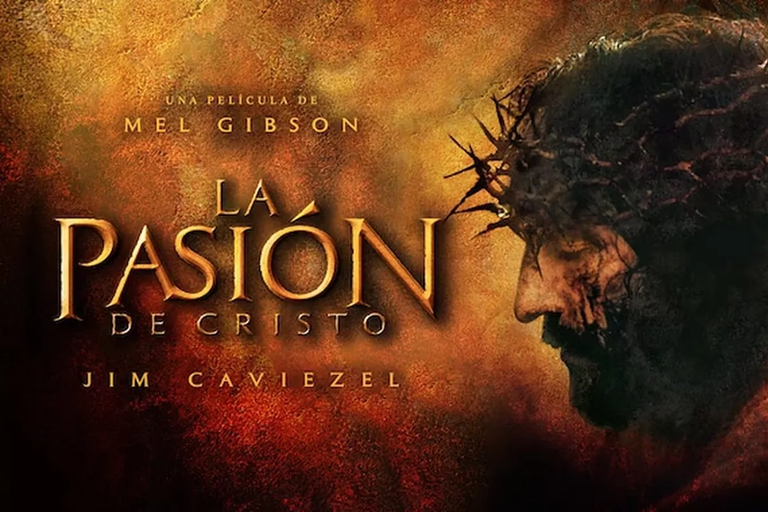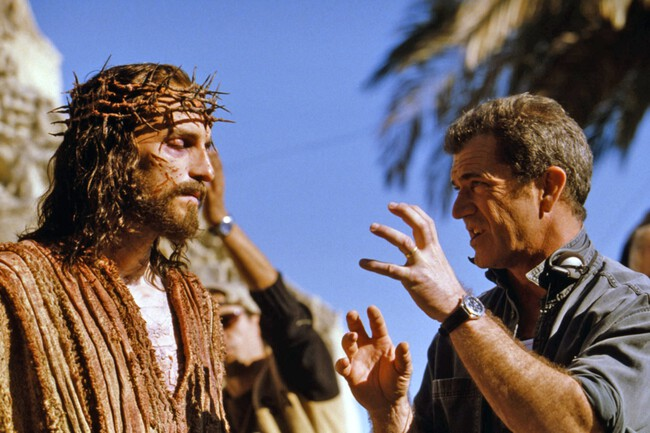CineTV Contest: The Passion of the Christ

I haven't really participated in this contest for a long time, but when I saw this week's theme I really wanted to participate with a film that at the time generated a lot of controversy and that strangely was not an erotic film or a film about drugs or anything like that, but it was a religious film, one that portrayed the last days of Jesus' life, his sacrifice and surrender for the salvation of the world.
¡Vaya! De verdad tengo mucho tiempo que no participo en este concurso, pero al ver el tema de esta semana sentí muchísimas ganas de participar con una película que en su momento generó muchísima controversia y que extrañamente no se trataba de un film erótico o que tocara tema de drogas o algo así, sino que se trataba de un film religioso, uno que retrataba los últimos días de la vida de Jesús, su sacrificio y entrega para la salvación del mundo.

This film by Mel Gibson was released in my country, Venezuela, on March 26, 2004 and even before its release it was already causing controversy, many people were talking about it and I remember it was trending in the news and newspapers in my country, why? If we are talking about a religious film, one that portrays the last moments in the life of Jesus, then that was precisely one of the elements that caused the controversy, because Mel Gibson, who was very committed to his own project, worked with a lot of perfectionism in every aspect of the film, He wanted to highlight every detail, but especially the violence and brutality with which the son of God was treated. The interpretations of the worst moments were so graphic that it is said that many people left the cinemas because they could not bear to watch any more, and it is even said that some people died of heart attacks.
Este film de Mel Gibson fue estrenado en mi país, Venezuela el 26 de marzo del 2004 y aún antes de su estreno ya estaba causando controversia, muchas personas hablaban de él y recuerdo que era tendencia en los noticieros y periódicos de mi país ¿por qué? si estamos hablando de un film religioso, uno que retrata los últimos momentos en la vida de Jesús, pues fue precisamente ese uno de los elementos que causó la controversia, debido a que Mel Gibson, quien estaba muy comprometido con su propio proyecto, trabajó con mucho perfeccionismo en cada aspecto del film, queriendo resaltar cada detalle pero en especial la violencia y brutalidad con la que fue tratado el hijo de Dios, las interpretaciones de los peores momentos fueron tan gráficas que se dice que mucha gente salía de las salas de cine al no poder soportar ver más e incluso se cuenta que algunas personas murieron a causa de infartos.

I must confess that when I saw the film for the first time I was very affected emotionally, beyond the simple sight of the blood, what affected me was the fact that I knew that this really happened to Jesus, (and this was precisely what Gibson was looking for) that the audience would feel empathy for the main character, Jesus, in real life, did not just receive a few lashes as we see in other films of this type, no, his skin was cut, torn, his body was mutilated in a terrible way and the scene of the crucifixion was so crude that it even shows us how the Roman soldiers dislocate one of Jesus' arms, This makes us understand, feel an emotional and almost physical pain, which brings me to the next point I want to highlight, and that is that Gibson also wanted to portray in his film, what is the pain of a mother who sees her son suffer in this way, Mary accompanied Jesus in his last moments, But she felt in her heart every scourge and every humiliation that he received, the look of the actress who plays her reflects the great pain that her character experienced, the desire she had to change places with him without being able to do so because she had to let the prophecy be fulfilled.
Debo confesar que cuando yo vi el film por primera vez quedé muy afectada emocionalmente, más allá de la simple visión de la sangre, lo que me afectó fue el hecho de saber que esto de verdad le ocurrió a Jesús, (y esto era precisamente lo que buscaba Gibson) que la audiencia sintiera empatía por el personaje principal, Jesús, en la vida real no solo recibió unos cuantos azotes como vemos en las demás películas de este tipo, no, su piel fue cortada, desgarrada, su cuerpo fue mutilado de forma terrible y la escena de la crucificción fue tan cruda que incluso nos muestra como los soldados romanos dislocan uno de los brazos de Jesús, esto nos hace entender, sentir un dolor emocional y casi físico, lo que me lleva al siguiente punto que quiero resaltar, y es que Gibson quiso también retratar en su película, lo que es el dolor de una madre que ve a su hijo padecer de esa manera, María acompañó a Jesús en sus últimos momentos, pero ella sintió en su corazón cada azote y cada humillación que él recibía, la mirada de la actriz que la interpreta refleja el dolor tan grande que experimentaba su personaje, las ganas que tenía de cambiar de lugar con él sin poder hacerlo ya que debía dejar que se cumpliera la profecía.
On the other hand, something that also caused controversy was the fact that Mel Gibson produced the film on his own, as it was initially rejected by Hollywood claiming that it could create anti-Semitic feelings, in fact many clung to this idea to reject the film, but the reality is that Gibson abhors anti-Semitism, like most Christians, In my opinion the film only seeks to tell us in a graphic way, without filters and without euphemisms what happened at that time, what exactly happened to Jesus, a peaceful man who only preached love and forgiveness, whether you are a believer or not this film moves you, it makes you reflect on how every day, somehow, we continue to martyr Jesus with our evil actions, so contrary to his ideals.
Por otra parte, algo que también causó controversia fue el hecho de que Mel Gibson produjera por su cuenta el film, ya que en un inicio fue rechazado por Hollywood alegando que podía crear sentimientos ansemitas, de hecho muchos se aferraron a esta idea para rechazar el film, pero la realidad es que Gibson aborrece el antisemitismo, como la mayoría de los cristianos, en mi opinión el film solo busca contarnos de forma gráfica, sin filtros y sin eufemismos lo que ocurrió en esa época, lo que le ocurrió exactamente a Jesús, un hombre pacífico que solo pregonaba el amor y el perdón, seas creyente o no esta película te conmueve, te hace reflexionar acerca de como cada día, de alguna forma, nosotros seguimos martirizando a Jesús con nuestras malas acciones, tan contrarias a sus ideales.
Well friends, that's my opinion about the controversy that this film generated even before its release, I hope you see it if you haven't already because it's really worth it. Thanks for the time invested in reading this post. 😊
Y bien amigos, esa es mi opinión acerca de la controversia que generó esta película desde incluso antes de su estreno, espero que la vean si aún no lo han hecho porque realmente vale muchísimo la pena. Gracias por el tiempo invertido en leer este post. 😊

Imagen diseñada por mi en el editor de Canva.